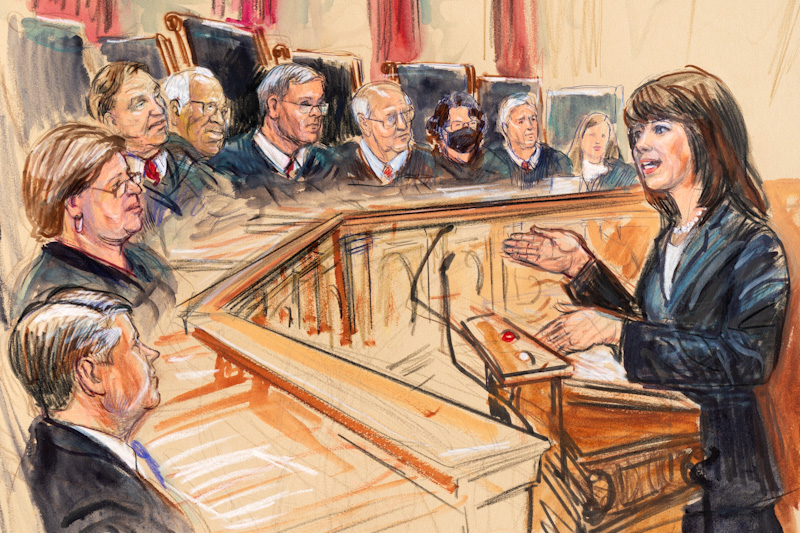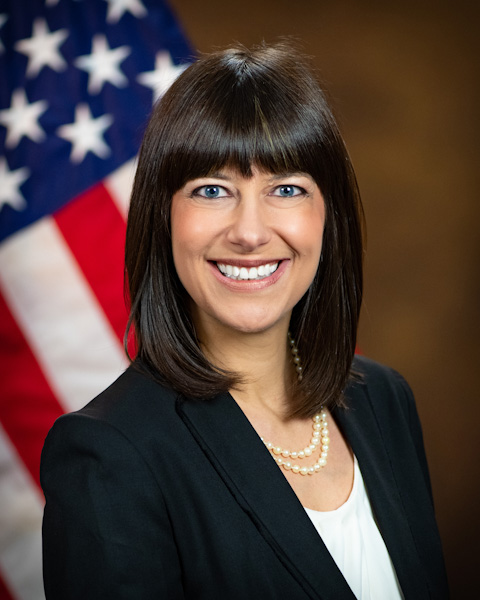Solicitor General Elizabeth Prelogar embraces tough task at conservative-leaning Supreme Court

This artist sketch depicts U.S. Solicitor General Elizabeth B. Prelogar, right, presenting an argument before the U.S. Supreme Court in November 2021 in Washington, D.C. Sketch by Dana Verkouteren via the Associated Press.
During May and June, when the term’s arguments are over and the U.S. Supreme Court takes the bench to announce the bulk of its decisions, it’s customary for members of the U.S. solicitor general’s office to come to the court and fill the seats at the counsel tables.
Solicitor General Elizabeth B. Prelogar was frequently present on those days this past spring, leading six to eight of her deputies and assistants to listen to opinions—many in cases that involved the United States as a party or amicus.
With Prelogar representing a Democratic administration before a conservative-dominated bench, she was no doubt braced for defeat in some of the eight cases she personally argued and in others in which her office had a stake.
“I often get asked a version of this question: ‘What happens when you know you’re going to lose?’” Prelogar said this week in an appearance at the University of Wisconsin Law School. “I’m an incorrigible optimist. … The number of cases where it’s locked in stone and there’s no room for any persuasive advocacy or lawyering to affect anyone’s thinking in any way, shape, or form—the number of cases in that category, I think, is vanishingly small.”
But on several days this spring, Prelogar and others in her office broke into ebullient smiles and handshakes after the justices left the bench. Among the happy days for Prelogar was June 8, when the justices ruled 5-4 in Allen v. Milligan to uphold a lower court decision requiring Alabama to come up with a congressional redistricting map with a second majority-Black district.
On June 23 came an 8-1 ruling in United States v. Texas that two states lacked standing to challenge guidelines from President Joe Biden’s administration on immigration enforcement, allowing the priorities to remain in effect.
And on June 27 came the 6-3 decision in Moore v. Harper, in which the court accepted the arguments of Prelogar and private parties that state legislatures do not have independent authority to set rules for federal elections.
 “What you see at the podium in her is a reflection of a lifetime of training,” says Michael R. Dreeben, a longtime career deputy solicitor general and now a partner at O’Melveny & Myers, who worked with Solicitor General Elizabeth B. Prelogar when she was an assistant in the solicitor general’s office for several years from 2014 to 2019. “She is brilliant.” Photo from the U.S. Department of Justice.
“What you see at the podium in her is a reflection of a lifetime of training,” says Michael R. Dreeben, a longtime career deputy solicitor general and now a partner at O’Melveny & Myers, who worked with Solicitor General Elizabeth B. Prelogar when she was an assistant in the solicitor general’s office for several years from 2014 to 2019. “She is brilliant.” Photo from the U.S. Department of Justice.
‘A tough job’ representing an administration left of the court
Of course, Prelogar had some disappointing opinion days as well. The last week of the term brought a stinging defeat on affirmative action, with the court ruling 6-3 in Students for Fair Admissions v. President and Fellows of Harvard College that universities may not continue to take account of the race of applicants for admission as they have for decades. Prelogar had argued as an amicus supporting affirmative action in the Harvard case and a separate case involving the University of North Carolina. Even though the eventual opinion consolidated the two cases, some analysts chalked up two defeats for the solicitor general.
In two cases involving President Joe Biden’s $400 billion student loan relief plan, Prelogar won one decision—a unanimous ruling in Department of Education v. Brown that two individuals lacked standing to challenge the plan. But she lost the bigger enchilada in Biden v. Nebraska, in which the court ruled 6-3 to invalidate the relief plan.
And in the last of Prelogar’s argued cases, Groff v. DeJoy, about a U.S. postal employee seeking to avoid shifts delivering packages on Sundays for religious reasons, the court unanimously revived the employee’s lawsuit and clarified federal employment law in a way that is expected to make it easier for workers seeking such accommodations. But the court did accept some of Prelogar’s arguments against overruling a key precedent on religious accommodations in the workplace.
That gave Prelogar a 4-4 win-loss record, with the loss in Groff arguably meriting at least an asterisk.
“She has a very tough job, given that she’s representing an administration that is quite a bit to the left of where the center of the court is,” says Neal K. Katyal, who was acting U.S. solicitor general under President Barack Obama and is now a frequent Supreme Court advocate at Hogan Lovells. “Her win-loss record at the end of the day may not be as strong as some other SGs, but she has a much tougher task than they did.”
Katyal hired Prelogar at Hogan Lovells in 2011, after she had served as a law clerk to Justices Ruth Bader Ginsburg and Elena Kagan in successive terms.
“Justice Ginsburg told me she was the best law clerk she had had in 30 years,” Katyal says. “Within five days, that was very apparent to me.”
Katyal, who argued on the same side as Prelogar in Moore v. Harper but has yet to argue against her directly, says, “She is an incredibly open and honest person, and that is what she brings into the court and oral advocacy.”
Prelogar, a Boise, Idaho, native who attended Emory University, the University of St. Andrews, and Harvard Law School, declined an interview request. But in a series of public appearances this year, the 43-year-old solicitor general has opened up a bit about her approach to the job.
The most recent of those was Sept. 12 at the Wisconsin law school event. Prelogar said that on the nights before her arguments, she rehearses her opening statement on her two preteen sons. They have graded her as high as 11 (out of 10) and as low as 7, with one child admitting he did not fully comprehend her points about statutory interpretation in an immigration case.
Prelogar’s first argument as solicitor general was on Nov. 1, 2021, in a high-stakes case about Texas’s Senate Bill 8 law restricting abortion. That was just days after she had been confirmed by the Senate, yet the high-pressure situation did not lead her sons to relieve her of her promise to take them trick-or-treating the night before.
“In my household, Halloween is a very important holiday,” Prelogar said. “My boys made clear this was a command performance for me.” So as she chaperoned her children through their neighborhood, “I was kind of going over the legal arguments in my head.”
Tough questioning for those who can take it
Michael R. Dreeben, a longtime career deputy solicitor general and now a partner at O’Melveny & Myers, worked with Prelogar when she was an assistant in the solicitor general’s office for several years from 2014 to 2019 (with a period of a couple years dispatched to the investigation of Russian election interference by special counsel Robert Mueller).
“What you see at the podium in her is a reflection of a lifetime of training,” Dreeben says. “She is brilliant.”
Nevertheless, Prelogar has faced some criticism. The Washington Post in July published a lengthy article analyzing the lack of gender, racial, and ethnic diversity in the solicitor general’s office.
The paper noted that Prelogar herself had made a point during the affirmative action arguments about the need for diversity among those arguing before the court.
Prelogar declined to comment to the Post for that story, but had told the paper in a statement last year that “there is more work to be done to ensure that we reflect the American people as we represent them before the court” and that she was committed “to seeking out, hiring, and retaining outstanding attorneys who fully represent our nation’s diversity.”
Ryan J. Owens, a professor of political science at the University of Wisconsin-Madison, listens to the livestream of every argument.
“I think there is no question the justices respect her legal acumen,” says Owens, who co-wrote a 2012 book about the solicitor general’s office. “But there are moments when you almost see the justices bristle. In some of the arguments the solicitor general has been making, you almost get the sense she is trying to run out the clock.”
Prelogar’s fans disagree with that assessment.
“I think the court is tough on her because the court is tough on any advocate it knows can withstand the questioning,” says Katyal. “If you are a good advocate, you really want that kind of pressured questioning.”
Leah Litman, a law professor at the University of Michigan and co-host of the Strict Scrutiny podcast about the high court, said in a July episode that Prelogar “is fantastic, and she is doing wonderful things in that office. I think in a few of the cases, she basically proposed the route of least possible damage to the court, and they ended up taking it and avoiding potentially larger determinations,” Litman said.
Prelogar is expected to argue some of the most difficult cases of the new term.
“I really think in every case, it is incumbent on us as attorneys representing the government to roll up our sleeves and make the very best arguments we can on behalf of the United States in defense of the interests of the federal government,” she said at the Wisconsin event.
“And it doesn’t get old,” she added. “I am so lucky to get to stand at the podium in the United States and think I’m in here representing my nation. That’s a privilege, and even in the hard cases I feel lucky to serve in the role.”
Write a letter to the editor, share a story tip or update, or report an error.


